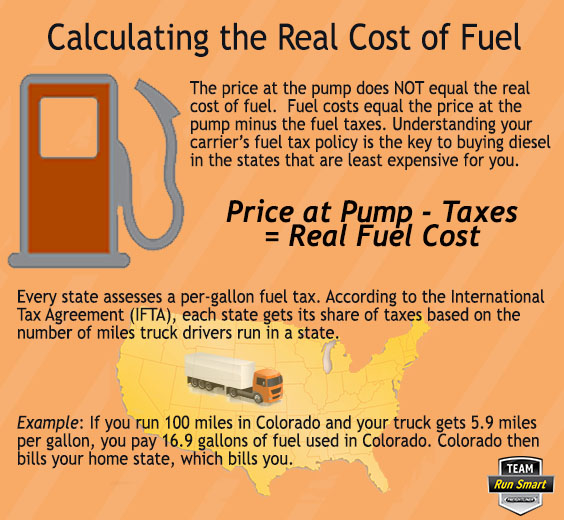It’s easy to become so focused on the price at the pump that you lose track of the real cost of fuel: the pump minus the taxes. Savvy owner-operators know there are ways to save money on the fuel they buy, but also on the fuel taxes they pay. Understanding your carrier’s fuel tax policy is the key, so you can buy diesel in the least expensive states for you.

Every state assesses a per-gallon fuel tax, ranging from 15 cents a gallon in some states to more than 30 cents a gallon in others. If you’re not careful about where you buy fuel, you can easily overspend more than $1000 a year. Daily state-by-state fuel prices and fuel tax listings are available through websites such as eTrucker.com. The information can also be found in fuel tax software programs and in motor carrier atlases, such as those published by Rand McNally. (Is paying diesel tax at the pump plus a quarterly diesel tax a double taxation? No. The quarterly payment, or credit, is designed to resolve any underpayments or overpayments of fuel tax in states where you’ve driven.)
So How Does Fuel Tax work?
According to the International Fuel Tax Agreement (IFTA), each state gets its share of taxes based on the number of miles truck drivers run in a state. So, if you run 100 miles in Colorado and your truck gets 5.9 mpg, you pay tax on 16.9 gallons of fuel used in Colorado. Colorado then bills your home state, which bills you. But if you buy more fuel in Colorado than your mileage requires, Colorado refunds your state, which in turn refunds you. This isn’t a big issue if you only run in a few states, but if you run in many states, varying fuel tax rates can mean hundreds of dollars added or subtracted to your bottom line.
Some carriers pay fuel taxes and charge them back to their leased owner-operators. Other companies pay the tax and absorb the cost. If your company pays the tax and doesn’t charge you, simply do the obvious thing and buy fuel where the pump price is lowest. But if you have to pay the tax, make the system works to your advantage by considering state fuel taxes every time you buy fuel.
Know the current fuel tax rates, both federal and state, and any state surcharges. Subtract taxes to find the raw fuel cost in each state, and then buy where the net cost of fuel is the cheapest. This strategy means you buy without regard for whether you are paying more at the pump, or in taxes at the end of the quarter. Whether you pay at the pump or quarterly, your taxes are the same since the IFTA distributes your taxes according to the miles run in each state.
What About Fuel Surcharges?
IFTA figures in state surcharges, which complicates the fuel-buying strategy. Some states have per-gallon surcharges and some also have per-mile surcharges. Click here for the list of fuel surcharge states. While some owner-operators believe in only buying enough fuel to get through the surcharge states, this practice can backfire, depending on the actual cost of fuel in each state. There may be times when buying more fuel in a surcharge state is more economical.
Changing Surcharges and Taxes.
Being fuel smart can be challenging because you have to keep up with changing surcharges and taxes. Some states change their fuel taxes quarterly, and North Carolina even revises it’s semi-annually.
Other Fuel Buying Costs.
Other fuel costs depend on how your fuel taxes are managed. Most leased owner-operators depend on a carrier to collect and distribute fuel taxes. Some carriers charge a fee for this and some pay by averaging the mileage of their entire fleet. If your carrier does this, you could be paying more tax than you owe.
A good lease will itemize all charges, including fuel taxes and how they are assessed, but other leases make a blanket statement on fees. If your settlements do not reflect what is stated in the lease, you can ask for clarification and look for another method of paying your tax if necessary. However, not all carriers will let you opt out of their system. You must get your own IFTA account to do your own fuel tax reporting, whether you do it yourself or through a third party. Independent owner-operators must have an IFTA account in their base plate state and be responsible for quarterly reporting.
You can use knowledge of state fuel taxes to smooth your cash flow and avoid paying surcharges or large tax bills. Good fuel tax management, combined with trip planning that incorporates the smartest stops for buying fuel, can help maximize your fuel dollars. Fuel buying decisions based on the pre-tax price of fuel is definitely a good way to run smart.